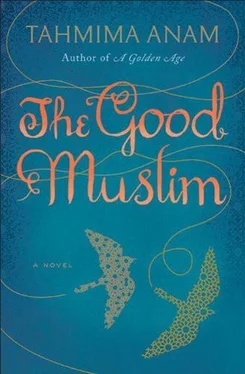Joy approached them, wiping his hands on a cloth napkin. ‘Delicious dinner, Saima. You’re as talented as you are beautiful.’
‘Flirting with my wife?’ Chottu said, slapping Joy hard on his back. ‘Someone should, I don’t have time for flirting-shirting — too busy making enough money to keep the woman in saris and earrings.’
Saima smiled, her face broad and tight.
‘Better be careful,’ Joy said. ‘Your wife is beautiful and your stomach is getting bigger by the day.’
‘Wife will come and go, my friend, but my tongue serves no woman.’
Over dessert — fruit trifle, made of tinned pineapples and peaches — the woman called Aditi approached Maya again. ‘Eaten?’
‘Yes, it was delicious.’
‘Saima always cooks enough to feed an army.’ Aditi lowered her voice. ‘To be honest I prefer dal-bhaat to this biryani stuff any day.’
‘Me too,’ Maya said.
‘Perhaps you’d like to meet other dal-bhaat people.’
‘Other dinosaurs, stuck in the past?’
‘Journalists.’
Maya was sceptical. ‘You mean the people telling us the Dictator is a great leader?’
‘We’re not all the same.’ She wrote an address on a piece of paper. ‘Come in for a visit.’
She folded the note into her palm — something to set against Saima’s biryani, her Alhamdulillah.
‘Call me,’ Saima said, hugging her tightly. ‘What am I saying, you’re playing hard to get. I’ll call you. I’ll call you tomorrow. We’ll have lunch. Oh, and tell your mother I send my love. Tomorrow, okay? Don’t forget.’
Maya hoped Joy wouldn’t speak on the ride home. Her sari had collapsed, and she had given up on it, putting her foot on the seat and allowing the pleats to unfold on her lap. The night was making her queasy. She thought about how excited Saima had been to see her — and how eager those villagers in Rajshahi had been to get rid of her. She was hovering in limbo. She felt too old and too young. Ugly. Ugly spinster in an ugly sari. Even so, it would be easy to slip back in. They would all forget about this awkward encounter and there would be afternoons with Chottu and Saima, swinging her legs over an armchair. She might persuade them to talk about the past, but mostly they would talk about each other and the people they knew, gossiping and complaining about the heat. A part of her wanted to do it, but she knew she wouldn’t. Was Joy thinking this, driving her home in silence? She didn’t care. He hadn’t exactly jumped to her defence. It was a mistake, this party — a mistake to think she could come home and everything would be as it was before.
*
Maya tried to forget about the party. She occupied herself with observing the comings and goings of the upstairs. The plump woman was called Khadija and she was the daughter of a wealthy farmer in Sylhet. She took over Silvi’s sermons; twice a day the crowds of women arrived and packed themselves into the upstairs rooms. There were rumours of groups from as far away as Italy and Cuba.
The bungalow telephone rang at four every afternoon, and a young woman from upstairs sat waiting for it. She came a few minutes early and hovered in the doorway, removing her shoes and nervously curling her socked toes.
By the time the phone rang she was ready to spring, but she would wait for someone to come out of the kitchen and answer, and when Maya or Rehana extended the receiver, she grabbed it with both hands. Then she squatted on the floor and whispered. The conversation lasted only a few minutes before she hung up and scampered back upstairs.
Maya collected these titbits. A girl who whispered into the telephone, a boy who carried water in a bucket.
They prepared the empty patch at the western edge of the garden. It was the perfect location, catching the south-facing wind, sheltered from the sun by the coconut tree that towered over it. Ammoo leaned over the hole Maya had dug and unwrapped the jute sackcloth, running her fingers along the delicate roots of the young tree. She whispered a prayer and, softly, blew the air out of her mouth and over the tree. Long may you bear fruit, she said. Maya helped her close the earth over its wound, and together they poured a few cupfuls of water on the mound.
‘Ma,’ Maya said, ‘I think Sufia is stealing from me.’
Ammoo’s head swivelled around. ‘Where did you get that idea?’
‘Some notes missing from my bag.’
Ammoo put a finger over her mouth. ‘Quiet,’ she said. ‘She could come out of the kitchen and hear you.’
‘If she’s a thief I shouldn’t have to whisper about it.’
‘She’s been with me for six years, she’s never taken a pie.’
‘Well, maybe she has something against me.’
‘Don’t be ridiculous. Why don’t you check again? Maybe you miscounted.’
Ammoo seemed so sure. ‘I suppose. Maybe.’
Maya discovered one of her old medical journals in the shed, an issue of the Lancet from 1960 — she remembered coming upon it at a second-hand bookstall in Nilkhet just after the war. ‘Common Causes of Eye Injury in the Young’, she read. Suddenly she heard a scuffle, and her mother saying ‘This is not the first time, beta’ in a low, serious voice. Maya closed the journal and tiptoed towards the kitchen. A heavy crash. Maya found Ammoo standing over Zaid, her hand in the air.
Ammoo turned around and saw her. ‘Maya, please go.’ Zaid was holding a plate in his hand; around his feet were the remnants of another. He refused to meet Maya’s eye, his head down. ‘Maya, I said please go, I will handle this.’
Maya slipped out, blinking into the sunshine. Later, Ammoo paced the verandah in a pair of rubber slippers, her footsteps mimicking the sound of slapping.
‘It was him,’ Ammoo said. ‘He took the money.’ She handed Maya a few notes. ‘Here, take this.’ Ammoo’s hand was shaking. Tiny pearls of sweat along her hairline.
‘Please, Ma, it’s no big thing.’
‘He steals, he lies. I don’t know what to do.’
Maya remembered the Ludo board, suspiciously new. ‘His mother has just died, he’s trying to cope.’
Ammoo shook her head. ‘It’s not that.’
‘Did you hit him?’
Ammoo shook her head. ‘He has a temper. A few months ago he set the curtains on fire. I thought the whole house would burn down.’
The next week Rehana was rolling out rootis. Maya and Zaid squatted on a couple of low stools, waiting for her to fry the bread and pass it around. A crow shuffled sideways on the high wall outside the kitchen window.
‘Why doesn’t it have shoes?’ Zaid said.
‘The crow?’ Rehana asked.
‘Because it has claws,’ Maya said. ‘And anyway, birds don’t need shoes, they have wings.’ You’d like pair of wings, wouldn’t you, she thought. Then she said, ‘Do you know your alphabet?’
‘Alif, ba, ta, sa,’ he mumbled, chewing intently on his rooti.
‘Not Arabic, Bangla. Do you know ko kho?’
He tore off another piece of bread. ‘No,’ he said.
‘All these languages and you don’t know your own alphabet. I’ll teach you.’
‘I have to go.’ He darted from the kitchen, skipping over the rui fish that was laid out on the floor, gutted and glass-eyed.
Zaid filled his water bucket, and Maya helped him to heave it up the stairs. At the top she saw that the washing was out today, three sets of black burkhas and a white jellaba hanging between them like a flag of surrender. Rehana had told her the upstairs women dried their underthings at night and took them away before the Fajr prayer at daybreak. Fine for these hot spring nights, but probably not very effective in winter. A roomful of cold arses — the thought made her laugh out loud.
‘Come tomorrow,’ she said; ‘we’ll do ko kho.’
Читать дальше












